
A sex worker is a person who provides sex work, either on a regular or occasional basis. The term is used in reference to those who work in all areas of the sex industry.

Prostitution in the Netherlands is legal and regulated. Operating a brothel is also legal. De Wallen, the largest and best-known Red-light district in Amsterdam, is a destination for international sex tourism.
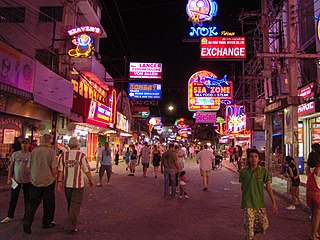
Prostitution in Thailand is not illegal. Section 5 of the relevant Act makes that very clear. What is forbidden is openly and shamelessly offering sexual services or causing a public nuisance. However, due to police corruption and an economic reliance on prostitution dating back to the Vietnam War, it remains a significant presence in the country. It results from poverty, low levels of education and a lack of employment in rural areas. Prostitutes mostly come from the northeastern (Isan) region of Thailand, from ethnic minorities or from neighbouring countries, especially Cambodia, Myanmar, and Laos. In 2019, UNAIDS estimated the total population of sex workers in Thailand to be 43,000.
Prostitution in South Korea is illegal, but according to The Korea Women's Development Institute, the sex trade in Korea was estimated to amount to 14 trillion South Korean won in 2007, roughly 1.6% of the nation's GDP. According to a survey conducted by the Department of Urology at the Korea University College of Medicine in 2015, 23.1% of males and 2.6% of females, aged 18–69, had sexual experience with a prostitute.
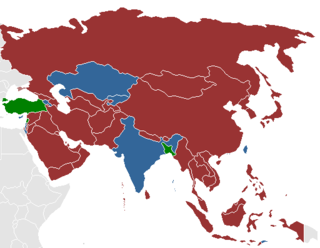
Prostitution is legal in India, but a number of related activities including soliciting, kerb crawling, owning or managing a brothel, prostitution in a hotel, child prostitution, pimping and pandering are illegal. There are, however, many brothels illegally operating in Indian cities including Mumbai, Delhi, Kolkata, Pune, and Nagpur, among others. UNAIDS estimate there were 657,829 prostitutes in the country as of 2016. Other unofficial estimates have calculated India has roughly 3 million prostitutes. India is widely regarded as having one of the world's largest commercial sex industry. It has emerged as a global hub of sex tourism, attracting sex tourists from wealthy countries. The sex industry in India is a multi-billion dollar one, and one of the fastest growing.
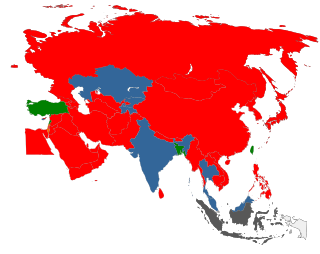
The legality of prostitution in Asia varies by country. There is often a significant difference in Asia between prostitution laws and the practice of prostitution. In 2011, the Asian Commission on AIDS estimated there were 10 million sex workers in Asia and 75 million male customers.

Prostitution is illegal in the vast majority of the United States as a result of state laws rather than federal laws. It is, however, legal in some rural counties within the state of Nevada. Additionally, it is decriminalized to sell sex in the state of Maine, but illegal to buy sex. Prostitution nevertheless occurs elsewhere in the country.
Forced prostitution, also known as involuntary prostitution or compulsory prostitution, is prostitution or sexual slavery that takes place as a result of coercion by a third party. The terms "forced prostitution" or "enforced prostitution" appear in international and humanitarian conventions, such as the Rome Statute of the International Criminal Court, but have been inconsistently applied. "Forced prostitution" refers to conditions of control over a person who is coerced by another to engage in sexual activity.
Prostitution is the business or practice of engaging in sexual activity in exchange for payment. The definition of "sexual activity" varies, and is often defined as an activity requiring physical contact with the customer. The requirement of physical contact also creates the risk of transferring infections. Prostitution is sometimes described as sexual services, commercial sex or, colloquially, hooking. It is sometimes referred to euphemistically as "the world's oldest profession" in the English-speaking world. A person who works in this field is called a prostitute, and sometimes a sex worker, but the words hooker and whore are also sometimes used to describe those who work as prostitutes.

Sex workers' rights encompass a variety of aims being pursued globally by individuals and organizations that specifically involve the human, health, and labor rights of sex workers and their clients. The goals of these movements are diverse, but generally aim to legalize or decriminalize sex work, as well as to destigmatize it, regulate it and ensure fair treatment before legal and cultural forces on a local and international level for all persons in the sex industry.

Prostitution in Vietnam is illegal and considered a serious crime. Nonetheless, Vietnam's Ministry of Labour, Invalids and Social Affairs (MOLISA) has estimated that there were 71,936 prostitutes in the country in 2013. Other estimates puts the number at up to 200,000.
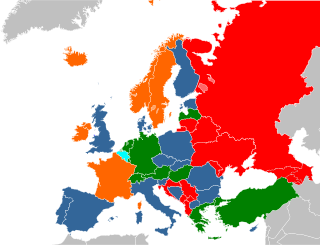
The legality of prostitution in Europe varies by country.

The sex industry consists of businesses that either directly or indirectly provide sex-related products and services or adult entertainment. The industry includes activities involving direct provision of sex-related services, such as prostitution, strip clubs, host and hostess clubs and sex-related pastimes, such as pornography, sex-oriented men's magazines, women's magazines, sex movies, sex toys and fetish or BDSM paraphernalia. Sex channels for television and pre-paid sex movies for video on demand, are part of the sex industry, as are adult movie theaters, sex shops, peep shows, and strip clubs. The sex industry employs millions of people worldwide, mainly women. These range from the sex worker, also called adult service provider (ASP), who provides sexual services, to a multitude of support personnel.
This is an overview of prostitution by region.

Prostitution laws varies widely from country to country, and between jurisdictions within a country. At one extreme, prostitution or sex work is legal in some places and regarded as a profession, while at the other extreme, it is considered a severe crime punishable by death in some other places. A variety of different legal models exist around the world, including total bans, bans that only target the customer, and laws permitting prostitution but prohibiting organized groups, an example being brothels.
Prostitution in Namibia is legal and a highly prevalent common practice. Related activities such as solicitation, procuring and being involved in the running of a brothel are illegal. A World Bank study estimated there were about 11,000 prostitutes in Namibia.
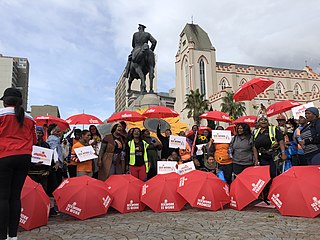
The decriminalization of sex work is the removal of criminal penalties for sex work. Sex work, the consensual provision of sexual services for money or goods, is criminalized in most countries. Decriminalization is distinct from legalization.
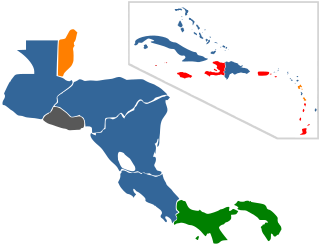
Legality of prostitution in the Americas varies by country. Most countries only legalized prostitution, with the act of exchanging money for sexual services legal. The level of enforcement varies by country. One country, the United States, is unique as legality of prostitution is not the responsibility of the federal government, but rather state, territorial, and federal district's responsibility.
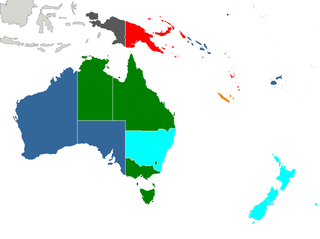
Prostitution in Oceania varies greatly across the region. In American Samoa, for instance, prostitution is illegal, whereas in New Zealand most aspects of the trade are decriminalised.
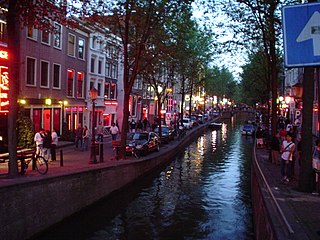
Feminist perspectives on sex markets vary widely, depending on the type of feminism being applied. The sex market is defined as the system of supply and demand which is generated by the existence of sex work as a commodity. The sex market can further be segregated into the direct sex market, which mainly applies to prostitution, and the indirect sex market, which applies to sexual businesses which provide services such as lap dancing. The final component of the sex market lies in the production and selling of pornography. With the distinctions between feminist perspectives, there are many documented instances from feminist authors of both explicit and implied feminist standpoints that provide coverage on the sex market in regards to both "autonomous" and "non-autonomous" sex trades. The quotations are added since some feminist ideologies believe the commodification of women's bodies is never autonomous and therefore subversive or misleading by terminology.














